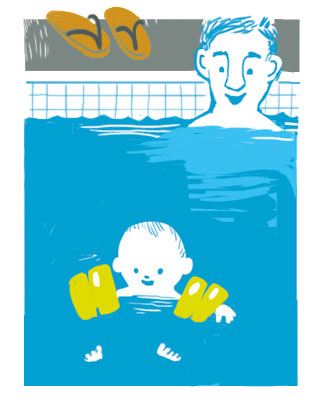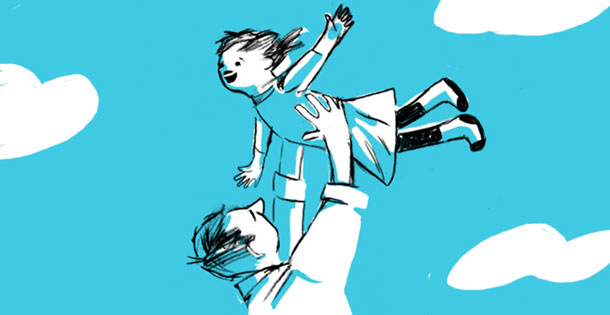From World War II through the 1960s, the few psychologists and other “experts” who thought about fathers believed that their main contribution was to be role models for gender appropriate behavior by their sons. They were supposed to teach their sons what it meant to be a man, as they usually put it. A few researchers thought it might be nice to measure that effect to see whether there was truly a correlation between masculinity in fathers and masculinity in their sons. (Masculinity refers to what we traditionally think of as male characteristics: toughness, power, status, sturdiness in a crisis, a willingness to take risks, and to ignore what others think.) The link should have been easy to find, but it wasn’t. There was no consistent connection between a father’s masculinity and his son’s. This posed a challenge to the conventional wisdom. If fathers weren’t helping to make boys into men, then what role did they have?
The problem was that nobody had asked why boys might want to be like their fathers. Presumably they would want to emulate their fathers only if they liked and respected them and had warm relationships with them. When researchers decided to look for that, in the 1960s, they discovered that the relationship between father and son was crucially important. When a father had a warm relationship with his son, that son would grow up to be more like his father than sons who were not close to their fathers. A father’s own masculinity was irrelevant; his warmth and closeness with his son was the key factor.
This was one of the first indications that fathers have a particularly strong influence on children’s social development. Interactions between fathers and their sons and daughters that are playful, affectionate, and engaging predict later popularity in school and among peers, perhaps by teaching children to read emotional expressions on their fathers’ faces, and later on those of their peer group. Harsh discipline by fathers, on the other hand, has been linked to later behavior problems in their kids.
These early discoveries prompted careful examination of fathers and their influence on their toddlers and school- age children. And one of the areas in which researchers looked for the influence of fathers was in the development of language. I’ve always thought that watching children learn to talk is one of the highlights of parenting. It’s a hallmark of their lives during their first few years. They learn to make their wishes known — often emphatically known. What begins in infancy with gestures and sounds develops into competence with language by around age 3. Fathers are proving to be an important part of this process, as Lynne Vernon-Feagans of the University of North Carolina and her colleague Nadya Pancsofar at the College of New Jersey are finding out.
They have done some of the most interesting work looking at children’s language development in both middle-class and poor, rural families. They’ve found, to their surprise, that not only are fathers important for children’s language development, but that fathers matter more than mothers. For example, when fathers used more words with their children during play, children had more advanced language skills a year later. In particular, they found that fathers’ use of vocabulary when reading picture books to their children at 6 months of age were significantly related to the children’s expressiveness at 15 months and use of advanced language at age 3. This held true no matter what the mother’s educational level was or how she spoke to the children.
When I spoke with Vernon-Feagans about her findings, she said she was surprised by the difference between mothers and fathers. She had thought they would be equally involved in encouraging their children’s language development. Why would fathers be more important in this regard than mothers? The hypothesis is that it’s because mothers are more attuned to their children, typically spending more time with them than fathers do. That makes mothers more likely to choose words the kids are familiar with. Fathers aren’t as attuned to their kids, so they use a broader vocabulary, and their children learn new words and concepts as a result.
Vernon-Feagans thought there might be another factor at play as well. Because fathers usually spend less time with their children, they are more of a novelty. That makes them more interesting playmates. “I do think our children see it as very special when they do book reading with their fathers,” she said. “They may listen more and acquire language in a special way.” The effect of fathers on children’s language continues until they enter school.

Illustration by Hadley Hooper
But fathers contribute to their children’s mental development more broadly than just with respect to language. They also influence their children’s intellectual growth, adjustment to school, and behavior, as Catherine Tamis LeMonda of New York University and her colleagues discovered. They were interested in the influence of fathers on language in families involved in Head Start, a pre-school program for low-income children. The researchers watched fathers’ interactions with their children — and, separately, mothers’ interactions with their children — during a period of free play when the children were 2 years old, and again when they were 3. They found that these were mostly good parents. They challenged the assumption by some researchers “that low-income parents primarily engage in authoritarian exchanges with their young children and that fathers are harsh disciplinarians.” And the sensitivity of the parents, their positive regard for their children, and the intellectual stimulation they offered predicted that the children would do well on tests of development and vocabulary later on.
Supportive parenting on the part of fathers was linked to a boost in children’s intellectual development and their language abilities. Fathers’ good behavior also improved the behavior of mothers with their children — an interesting indirect effect of good fathering. But the importance of father’s income varies from one study to the next. Daniel Nettle of Newcastle University found that wealthier fathers produced a greater rise in their children’s IQs than did similarly active low-income fathers. Nettle doesn’t say why this income disparity exists. It might sound discouraging, but it suggests that improving men’s educational or financial status would confer benefits not only on them but on their children as well.
But that’s not to say that fathers in poorer families have no influence; they do. In 2011, Erin Pougnet, Alex E. Schwartzman, and their colleagues at Concordia University in Montreal set out to assess fathers’ influence over children’s intellectual development and behavioral problems by looking at low- to middle-income families in which the fathers lived apart from their children, which is the case in about 22 percent of Quebec families. These families have reduced incomes, and the children are less likely to graduate from high school. The researchers looked at the data on the children when they were 3 to 5 years old, and again when they were 9 to 13 years old. They found that the presence of fathers in the home was associated with fewer of what are called “internalizing” problems — depression, fear, and self-doubt — in their daughters … but not in their sons. It was unclear why that was the case. And the children of fathers who exhibited more positive kinds of control, such as reasoning, scored higher on a measure of nonverbal intelligence called performance IQ. How fathers exert these effects is still being teased out. But clearly one way they do it is, again, through play. Mothers, who generally spend more time with their children, are seen by their kids as crucial sources of well-being and security. Children are more likely to think of their fathers as playmates. So it’s not too surprising that infants respond more positively to being picked up by their fathers, because they suspect that means it’s playtime.

“Fathers often use objects in an incongruous way,” writes Daniel Paquette of the University of Montreal. During rough-and-tumble play like this, fathers tend to use playful teasing to “destabilize children both emotionally and cognitively,” which children like — despite the seemingly ominous implications of the word “destabilizing.” It might not sound like a good idea, but this destabilization could have a critical function. It could be helping our children confront one of their principal challenges: the need to learn how to deal with unexpected events. “Children’s need to be stimulated, pushed, and encouraged to take risks is as great as their need for stability and security,” says Paquette.
Fathers’ unpredictability helps children learn to be brave in difficult situations or when meeting new people. In one study of 1-year-olds taken to swimming class, researchers observed that fathers were more likely to stand behind their children, so that the children faced the water, while mothers tended to stand in front of the children, the better to make eye contact. From this and other studies, he concluded that fathers may be especially important in supporting their children as they move from the family to the world outside the door. And one of the first and most important unfamiliar environments that children encounter is school. Children who make the transition from home to school more easily, who are free of behavior problems and relate well to their peers and teachers, are more likely to do well in kindergarten and elementary school.
One of the most convincing summaries of fathers’ contribution to children’s development comes from Sweden. Researchers at Uppsala University wanted to know if there was evidence to support arguments for more parental leave for fathers and for other measures that would increase the involvement of fathers in child-rearing. They collected 24 of what they thought were the best studies of father involvement and children’s outcomes. The studies were longitudinal, meaning they followed fathers and their families over at least a year. Such studies are generally more persuasive than those that simply ask families about current or past practices in the home. And when the data from a number of studies is combined and analyzed together in what’s called a meta-analysis, it can sometimes produce clearer results than can any single study alone.
The researchers found a wide variety of beneficial social and psychological effects stemming from fathers’ direct engagement with their children. Children whose fathers played with them, read to them, took them on outings, and helped care for them had fewer behavioral problems in the early school years, and less likelihood of delinquency or criminal behavior as adolescents.
Much of the evidence linking fathers to their children’s social competence comes back to the way they play with their children. You might notice a recurring theme here. Play changes as children grow older; tickling and chasing toddlers is gradually replaced by teaching kids to ride a bicycle, playing catch, riding roller coasters, and other more sophisticated kinds of play. (In my case, when my kids were teenagers and ready for Batman: The Ride at Six Flags, I was too terrified to join them. I still feel bad about that.) Play changes, but it remains a central part of the interactions between children and their fathers throughout childhood.
Ross D. Parke, of the University of California, Riverside, whose research has focused largely on the social development of children, thinks the way a father plays is the key to healthy development in kids. He says that when fathers exert too much control over the play, instead of responding to their children’s cues, their sons can have more difficulty with their peers. Daughters who were the most popular likewise enjoyed playing with their fathers and had the most “nondirective” fathers. The children of these fathers also tended to have easier transitions into elementary school.
Children whose fathers took turns being the one to suggest activities and showed an interest in the child’s suggestions grew up to be less aggressive, more competent, and better liked. These were fathers who played actively with their children, but were not authoritarian; father and child engaged in give-and-take.
The importance of play might be connected to the demands it places on both fathers and children to recognize one another’s emotional signals during fast-paced, intense activity — which is what children also need to do with their peers. Fathers should spend as much time as they can with their toddlers and school-age children. And they shouldn’t feel compelled to prop flash cards in front of them or read sixth-grade books to third-graders.
They should spend more time playing.
Excerpted from Do Fathers Matter? What Science Is Telling Us About the Parent We’ve Overlooked, published in June by Scientific American, an imprint of Farrar, Straus, and Giroux LLC. © 2014 by Paul Raeburn. All rights reserved.
Become a Saturday Evening Post member and enjoy unlimited access. Subscribe now



